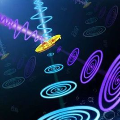Quantum annealing (QA) is a type of analog quantum computation that is a relaxed form of adiabatic quantum computation and uses quantum fluctuations in order to search for ground state solutions of a programmable Ising model. Here we present extensive experimental random number results from a D-Wave 2000Q quantum annealer, totaling over 20 billion bits of QA measurements, which is significantly larger than previous D-Wave QA random number generator studies. Current quantum annealers are susceptible to noise from environmental sources and calibration errors, and are not in general unbiased samplers. Therefore, it is of interest to quantify whether noisy quantum annealers can effectively function as an unbiased QRNG. The amount of data that was collected from the quantum annealer allows a comprehensive analysis of the random bits to be performed using the NIST SP 800-22 Rev 1a testsuite, as well as min-entropy estimates from NIST SP 800-90B. The randomness tests show that the generated random bits from the D-Wave 2000Q are biased, and not unpredictable random bit sequences. With no server-side sampling post-processing, the $1$ microsecond annealing time measurements had a min-entropy of $0.824$.
翻译:暂无翻译




